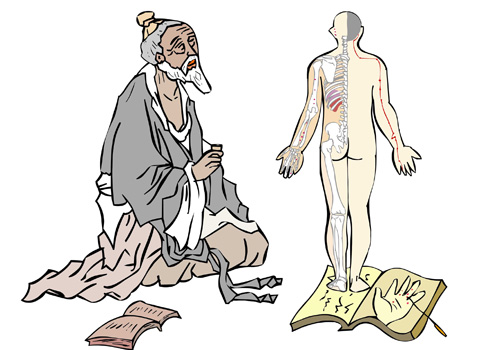|
 |
|
(LI SHIGONG) |
After a bumpy ride over the North Pole and Western Siberia, our big Air China Boeing 747 finally began to quiet down and relax as we began our descent into Beijing. Peering through the window, I saw the capital appear at a distance, shrouded and foggy in sandy green pastels. I pondered China's ancient past as the airplane touched down. We passengers entered a new, large and very clean airport and I approached the passport booth. As I entered this foreign land it was as if I heard a voice ring out:
"You are about to enter the forbidden world of Chinese traditional medicine. Be patient and attentive and ancient healing remedies will be revealed to you. Welcome to China!"
The Western view of medicine is somewhat like an automobile repair shop. If the exhaust pipe is burned out, you expect the mechanic to replace the damaged part. You might get upset if the mechanic instead offers to work on the engine.
Contrary to the world of machines, a Chinese traditional medicine doctor would possibly recommend treating an internal imbalance of yin and yang. Pain may be viewed as a natural symptom of a hidden problem. The common cold and coughing, for example, would be regarded as a weakening of the immune system. And, while conventional Western therapy treats the common cold with Tylenol, other painkillers or antibiotics, a Chinese doctor would offer herbal drinks to first detoxify the body and then support the natural anti-inflammatory healing process.
Many thousands of years ago Daoist masters defined major organs as meridians—invisible channels that interconnect the heart, kidney, liver and other internal organs. These organs are complementary and have the ability to rejuvenate other areas of the body. The understanding of this phenomenon allows treating "the root, not the symptom."
Upon my arrival in Beijing, a friend introduced me to Dr. Gao Shuan. The doctor is 80 years old but he looks like he is in his 60s. He has a soft smile and low voice that emits a warm, healing energy. He works at the International Center for Chinese Traditional Medicine and is a well-known specialist in acupuncture, acupressure, diet and herbal treatments, as well as a skilled practitioner in the highest art of qigong ("body energy work").
When I entered Gao's office, he looked at me as he knew everything about me already. First, he performed a complex pulse diagnosis. He placed his fingertips along the radial artery on each of my wrists. By applying various levels of pressure, an experienced doctor is capable of reading information from all major organ systems and determining their state of health. Gao prescribed a regiment of remedies to improve my health. Over the next several days I would receive treatment consisting of acupuncture, acupressure and massage. Gao explained that the healing power of acupuncture depends not only on the needles doing their jobs, but also on a "quality" of bio-energy invested by the qigong master into the patient.
The philosophy and practice of qigong that I learned from Gao was more than I could digest. If pressed to explain it to a busy Westerner, I would say that qigong is the path to a healthy and spiritually enlightened longevity of life. It taught me how to relax and breathe deeply to improve health without tranquilizers or pills.
In America today there are more than 40 million people diagnosed with high cholesterol. And unfortunately, I am one of them. To lower cholesterol, doctors routinely prescribe Lipitor. Even though it has side effects, Lipitor is considered to be safe. With the prescription in my hand, and fresh from my time experiencing traditional Chinese medicine, I asked my gastroenterologist why he was not looking into ways to improve my liver function—since maintaining a balance in cholesterol levels is a function of the liver. I read the silent answer in my doctor's eyes, as if he said, "It is what it is." At least for the time being!
Western and Eastern medicine is like the forces of yin and yang—opposing yet complementary, in which each cannot exist without the other. Chinese traditional healing methods are increasingly showing wider use in the West. Recent reports reveal that so-called "alternative medicine" is becoming more recognized in the United States. And insurance companies have begun to integrate traditional therapies into their plans and coverage.
Physicians are coming full-circle in their understanding of health. One of the newest fields fertile for the next great scientific discovery is the understanding of human bio-magnetic fields. Bioenergetic medicine originates in quantum physics, and involves electromagnetic fields existing in and around human and animal bodies. If the research succeeds, Western scientists will provide evidence supporting ancient Daoist teachings about energy centers, meridians and other ideas. The philosophies of East and West, like yin and yang, flow in a perfect circle.
The author is a Russian who used to work at UNDP and now lives in New York City
Email us at: liuyunyun@bjreview.com | 